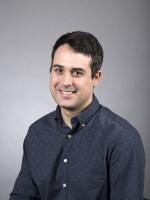Even before state officials designated the village a Superfund site late Wednesday afternoon, residents of Hoosick Falls have been waiting for a solution to their water contamination issue.
The Rensselaer County community of Hoosick Falls is grappling with a water crisis. Because of the presence of the chemical PFOA in the village water system, the U.S. Environmental Protection Agency is urging residents not to drink or cook with water from the public water supply.
A temporary filtration system is on track to be installed next month. Meantime, households are given a daily allowance of five gallons of bottled water.
On a recent afternoon outside the local Tops supermarket, Judy Tate unloaded jugs of water along with some groceries into her car.
“It’s certainly an inconvenience, you know?”
Company Saint-Gobain, whose buildings in town are at the center of the contamination question, is providing the bottled water. Tate is picking up the water for her daughter.
“By the time she gets out of work and heads to other stuff that she’s got to do, she won’t get here to the store in time.”
While the water is being provided at no cost, it’s still a challenge for villagers to get to the market every day, especially senior citizens and others with mobility issues.
That’s why a group of volunteers who call themselves the Water Angels have stepped up to deliver the water to those who cannot make it on their own.
Water Angels’ coordinator is Michelle O’Leary. She points out the list of names at the supermarket customer service desk where residents sign for their water allowance.
“They fill out this log sheet with their name….”
O’Leary said there’s a lot of anger and confusion in town.
“You kind of take water for granted until you realize how much you use it throughout the day and how often. It’s kind of inconvenient for a lot of people who can’t get water, and us delivering it…and we’re doing the best we can. And basically I’m not getting into the debates – the political stuff – I’m just trying to cover a need and make sure people are set who can’t do it for themselves.”
It’s not just families dealing with changing their routines. Restaurants and businesses on the village water system must also adapt. One local pizza shop uses bottled water to make the crust.
Father Tom Zelker, pastor at the Immaculate Conception Church, says the water issues are souring the mood among people of all ages.
“The teachers came back to our high school confirmation group, and they had been talking about water and baptism. And they had asked the high school kids what’s their image of water. And they all came back negative. They were scared about the water.”
Lawyers representing villagers are considering legal action on behalf of affected residents.
Despite the arguing, Zelker, who in a previous career worked for the City of Albany’s water supply, remains optimistic.
He said he appreciated the work being done by everyone to solve the issue while the presence and danger of the chemical was not completely understood since its initial discovery in 2014.
“Hoosick Falls, I think, should be commended, with the people working here, the leaders, the whole community of trying to do something good. We solved this problem, and I believe we’re going to. It looks like it’s going to happen.”
Speaking before the late-afternoon Superfund announcement by state agencies in Albany, village Mayor David Borge says he fully appreciates the concerns from village residents…
“I truly do. And it’s a major concern, there’s no question about it. And once again I want to say that the [Village] Board has been concerned about that and has taken a very proactive stance on this. Right from the beginning we started talking about this, about what we could do.”
A permanent filtration system is scheduled to be in place by October. But it remains to be seen how the town will be affected by a toxic chemical in its water supply.





